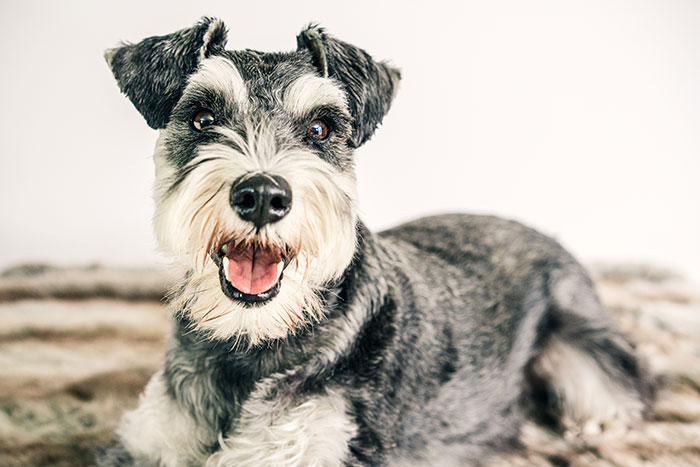
Tracking Schnauzer Health Problems
Schnauzers are a very popular dog breed. Their compact size and lively, personable, and sweet dispositions, makes them wonderful companions! But are there any downsides to this pure-breed pet? Are there any schnauzer health problems to be aware of before you adopt a schnauzer?
Let’s dive into the positives and negatives about this famously mustached breed!
What are Schnauzers?
Fun Fact: Did you know the word “schnauzer” in German roughly translates to “whiskered snout”? It’s a fitting name for this dog breed with their adorably bearded noses!
The standard schnauzer originally came from Germany and was a working dog. Schnauzers were historically farm dogs that killed rats and other vermin. They have since traded their hunting days in to be loyal, dedicated pets that come in a variety of sizes.
Common Personality Traits of Schnauzers
- High Energy – This breed is in the terrier family, so by nature, they have lots of energy. They love to play, run, dig, and socialize.
- Very Vocal – Miniature schnauzers do tend to bark a lot. Sometimes, it may be to alert you, but other times it’s just because they enjoy being vocal. This alert, noisy dog is a bad choice for backyard living and will make a much better house pet.
- Friendly – When properly socialized and trained from a puppy, schnauzers are great with other dogs and children.
- Intelligent – This breed is highly intelligent and can excel in obedience training and even learn to perform tricks.
- Hunters by Nature – Their ancestry is rooted in Germany where they hunted vermin. Although schnauzers get along well with other dogs, they may mistake cats, pet birds, and other small animals for vermin. Early socialization may mitigate this tendency to hunt but will never fully eradicate it. If you insist on living with a house full of hamsters, the schnauzer may not be the best dog breed choice for you!
Typical Physical Traits of Schnauzers
- Fur – Schnauzers have a coarse, terrier type fur that does not shed a lot. However, they do require regular professional grooming and trimming.
- Size – Miniature schnauzers tend to stay within 12 to 20 pounds, whereas the standard version can reach up to 50 pounds with the giant schnauzer reaching even larger sizes.
- Cropped Ears – The alert, classic look of the schnauzer is a result of ear cropping in puppyhood. This procedure is painful. Many people now choose to keep their schnauzer’s natural ears, which fold slightly forward to frame the face.
- Docked Tails – The classic schnauzer also has a cropped tail, which is a result of docking the tail as a puppy. As with ear cropping, many people now choose to avoid this painful procedure and keep their schnauzer’s natural tail.
Keep These Common Schnauzer Health Problems in Mind
Conditions common to the schnauzer breed include but are not limited to the following:
- Allergies – Sensitivity to environmental allergens that cause skin irritations
- Epilepsy – Recurrent, unprovoked seizures resulting from an abnormality of the brain
- Diabetes – When a dog’s body makes too little insulin, stops producing it completely, or has an abnormal response to insulin
- Pancreatitis – Inflammation of the pancreas that can occur suddenly (acute) or in persistent form (chronic)
- Bladder Stones – Struvite bladder stones are usually caused by bladder infections, which occur frequently in miniature schnauzers because of a breed-related weak urinary tract. These stones usually resolve after the bladder infection is treated with antibiotics but can sometimes require surgery. Calcium oxalate stones occur when the body doesn’t handle calcium correctly. The problem can be managed to a certain extent by diet, but it’s difficult. It is usually necessary to remove oxalate stones with surgery.
- Portosystemic Shunts (PSS) – Miniature schnauzers are 19.8 times more likely than all other breeds to be at risk for portosystemic shunts. These liver shunts in dogs are abnormal vessels that allow blood draining from the digestive system (stomach, intestines, pancreas) to bypass the liver and flow directly into the systemic circulation.
- Myotonia – Miniature schnauzers can carry this genetic disorder, which causes “hyper-excitable” muscles that contract easily. As the disease progresses, muscles bulge, and the dogs have problems getting up and walking. Their tongues enlarge, their jaws change shape, and they have trouble swallowing. Fortunately, a simple DNA test can tell you if a puppy’s parents carry the gene for myotonia, and whether your puppy is has the disease or is a carrier.
When looking for giant, standard or miniature schnauzer breeders, keep these schnauzer health problems in mind. Ensure your chosen breeder can produce paperwork showing a clean bill of health for your pup’s parents.
Pet Insurance for Schnauzers
Regardless of the breed of dog you choose, pet ownership is a huge responsibility – both timewise and financially. While adjusting schedules to include a new pup comes as second nature to many, thinking about affordable pet care options is often something new pet owners overlook.
But the good news is that you CAN prepare for some of the financial responsibilities of pet ownership!
Pet insurance for dogs can be a helpful tool in keeping your new family member in tip top shape! The very best time to invest in a pet insurance plan for your schnauzers is as a healthy puppy. You can’t predict the future, but having pet insurance is one thing you can do to help alleviate financial burdens of schnauzer health problems later in life.
Purchasing pet insurance for puppies, before any common schnauzer health problems arise, can help protect you from potentially expensive veterinary bills. Pet insurance can also provide financial coverage for the wellness preventative care of your pet (yearly bloodwork, vaccinations, routine dental cleanings). These regular visits can also be expensive over your pet’s lifetime. Investing in a pet insurance plan, like Spot Pet Insurance, while your furbaby is still young helps you to do whatever your pet will need over their lifetime without financial constraints and limitations.
Final Thoughts on Schnauzer Common Traits and Health Problems
Schnauzers are loving, affectionate, intelligent, and loyal companions. They will provide their owners with years of unwavering love and happiness.
Be aware of possible health concerns with schnauzers, and choose your schnauzer puppy from a reputable breeder who genetically tests the parents for common diseases. For miniature schnauzers, start your search for a good breeder with the American Miniature Schnauzer Club, which maintains a referral list for breeders who have agreed to be bound by the club’s Code of Ethics. The guidelines of the club even prohibit members from selling puppies to pet stores.
But one of the number one things I would tell any new pet parent is to invest in pet insurance early. You’ll set you and your pup up for a long life of health, happiness, and wellness.




